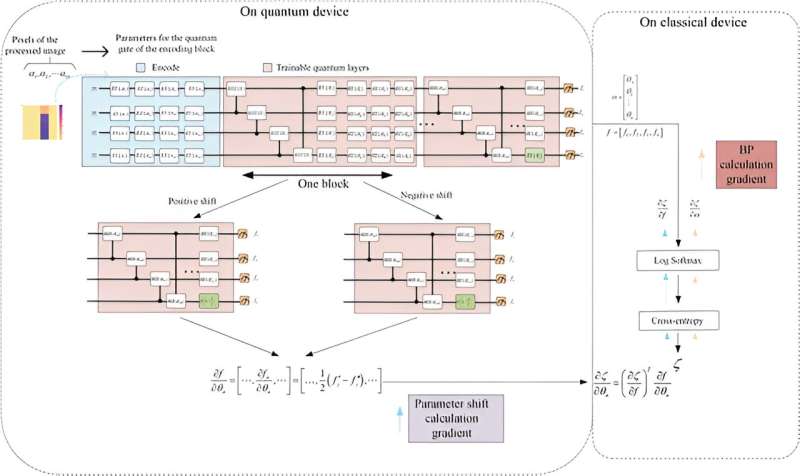
A team of researchers led by Yumin Dong of Chongqing Normal University has developed a novel method for optimizing parametric quantum circuits, an important component of variational quantum algorithms. The method combines the power of a gradient-free natural evolutionary strategy with gradient descent to overcome the notorious “barren plateau” problem, offering promising prospects for quantum computing and machine learning.
The study was published in Smart computing.
Variational quantum algorithms have emerged as a driving force in the field of quantum computing, with applications ranging from quantum chemistry and combinatorial optimization to machine learning tasks such as information recognition. One persistent challenge, however, has been the barren plateau problem.
In classical optimization, gradient-based methods rely on the gradient of the objective function, which is like a slope, to drive the optimization process. However, in the field of quantum computing, the barren plateau problem occurs when quantum circuits lack a discernible gradient in the landscape of the optimization problem.
“Due to the nature of quantum computers, many difficulties arise when calculating the gradient, such as numerous quantum calculations and the accumulation of errors from quantum noise and decoherence. These difficulties lead to the problem of vanishing gradient.” Without a gradient to guide the optimization, the situation seems to be stuck on a barren plateau, which makes it difficult to find a solution.
Traditional gradient-based optimization techniques are limited in dealing with barren plateaus. Previous ideas to mitigate barren plateaus, such as quantum natural gradients and parameter reset methods to avoid weak barren plateaus, also have limitations.
Researchers sought to address this challenge by harnessing the power of gradient-free natural evolutionary strategies.
According to the researchers, “these strategies should optimize quantum circuits in terms of the number of function evaluations and the scaling of the chain size. The gradient is efficiently evaluated with continuous evaluations that are not affected by the number of parameters. Furthermore, these function evaluations are fully independent and can be performed in parallel. This means that these methods are suitable for large-scale to solve problems.
The researchers introduced two specific methods: one, which they call NESSGD, combines a natural evolutionary strategy with stochastic gradient descent, while another, which they call NESAdaBelief, combines a natural evolutionary strategy with a variant of gradient descent. The aim of these methods is to optimize the parameters of parametric quantum circuits of variational quantum algorithms.
These methods were compared to methods that did not use a natural evolution strategy in five classification tasks. The two new methods showed improved performance at higher accuracy, demonstrating the potential of these methods to revolutionize quantum algorithm optimization.
To make their optimization approach practical for quantum computing, the researchers investigated the applicability of their variant of evolutionary stochastic gradient descent based on the parameter shift rule. This rule is a popular method for obtaining parametric quantum chain gradients. They showed that the method can adapt to this rule, paving the way for real practical applications of quantum hardware.
The results of this study have far-reaching implications for the future of quantum computing and its applications. The researchers said: “As a next step, we are considering combined strategies to further improve the training.” The ultimate goal is to increase the reliability of parametric quantum circuits in noisy medium-scale quantum hardware. “Our goal is to identify a strategy that can stably alleviate or resolve the ‘barren plateau’ and provide theoretical support for the widespread use of variational quantum circuits.”
More information:
Jianshe Xie et al, Natural Evolutionary Gradient Descent Strategy for Variational Quantum Algorithms, Smart computing (2023). DOI: 10.34133/icomputing.0042
Powered by Intelligent Computing
Quote: Natural Evolutionary Strategy Boosts Quantum Computing Performance (2023, September 25) Retrieved September 26, 2023, from https://phys.org/news/2023-09-natural-evolutionary-strategy-boosts-quantum.html
This document is protected by copyright. Except for fair dealing for private study or research purposes, no part may be reproduced without written permission. Content is provided for informational purposes only.
#natural #evolutionary #strategy #increases #performance #quantum #computers
Image Source : phys.org